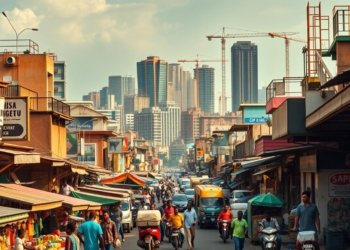What if the next big business success story comes from Africa? The continent’s startup scene is booming, with a 224.8% increase in funded ventures since 2015. Despite global funding challenges, African startups raised over $400 million in 2023 alone.
Companies like Flutterwave and Interswitch prove that success is possible with the right approach. They focused on solving real problems, testing MVPs, and forming strategic partnerships. Their journeys offer valuable lessons for new ventures.
Adapting to local markets is key. Jumia thrived by tailoring its e-commerce model, while Andela built a strong talent pipeline. These examples show the importance of cultural understanding and scalable solutions.
Key Takeaways
- African startups secured $400M+ in funding despite global declines
- Problem-solving and MVP testing drive success, as seen with Flutterwave
- Market adaptation is crucial, demonstrated by Jumia’s e-commerce model
- Strategic partnerships accelerate growth, like Ingressive Capital’s investments
- Cultural understanding separates thriving businesses from failed ventures
Why Africa Is a Prime Market for Startup Growth
Africa’s business landscape offers unmatched potential for innovative ventures. With 1.4 billion people—70% under 30—the continent boasts a tech-savvy consumer base eager for digital solutions.
Fintech leads the charge, fueled by a $6.6 billion mobile money market. Companies like M-Pesa prove that local challenges spark global innovations. In 2023, fintech claimed 45% of all investments in African startups.
Infrastructure gaps create room for disruption. Logistics firms like Lori Systems thrive by solving transport inefficiencies. Meanwhile, 40% internet penetration drives demand for edtech (uLesson) and healthtech (mPharma).
McKinsey predicts African consumer spending will hit $5.6 trillion by 2025. Agritech ventures like Twiga Foods tap into this by streamlining food supply chains. Fragmented markets? They’re gateways for scalable solutions.
Last year, 147 companies secured over $1 million in funding. The message is clear: Africa’s blend of youth, urgency, and untapped needs makes it a magnet for growth.
How to Grow Your Startup in Africa: Key Strategies
The fastest-growing ventures blend digital innovation with physical presence. Africa’s unique market dynamics reward founders who combine tech solutions with grassroots execution.
Identify a Pressing Problem to Solve
Successful companies address daily frustrations. Flutterwave focused on cross-border payments, while MaxAB streamlined Cairo’s fragmented retail supply chains. Both validated needs through street-level research before building.
Build and Test a Minimum Viable Product
OPay started with 300 agent locations before scaling to 300,000+. Early testing with physical cash-in/cash-out points refined their business model. This approach reduces risk before major tech investments.
Treepz UG proved demand by selling 600 bus tickets through roadside agents. Their MVP revealed customer preferences for face-to-face access despite having an app.
Leverage Local Networks and Offline Hustle
MaxAB onboarded 15,000 Egyptian retailers through warehouse meetups. Physical onboarding built trust faster than digital campaigns.
Grassroots tactics that drive growth:
- Partner with trade associations for market resources
- Set up pop-up stores in high-traffic markets
- Attend networking events like Lagos Fashion Week for B2B leads
- Train community leaders as referral agents
Twiga Foods grew by collaborating with agricultural boards. Their hybrid solution combined mobile ordering with local distribution hubs.
Securing Funding for Your African Startup
African founders are unlocking opportunities with diverse funding strategies. From venture capital to grassroots crowdfunding, the right approach depends on business stage and scalability. Credabile’s $2.5 million seed round proves early-stage ventures can attract major backing.

Exploring Seed Funding and Venture Capital
Seed funding fuels product development and early growth. Future Africa and Katapult Africa actively back high-potential ventures. Andela’s 500% YoY developer placement growth secured its Series A.
Y Combinator advises founders to retain control—limit equity to 10% during seed rounds. Sustainable models attract follow-on investments, unlike 55% of startups that fail to scale.
Alternative Funding: Grants, Crowdfunding, and Loans
Grants from USAID or Google’s Black Founders Fund offer non-dilutive capital. Crowdfunding platforms like BackaBuddy validate market demand. For loans, JUMO and 4G Capital provide flexible options.
NaiBAN bridges local and global capital, while Ilara Health’s cost optimization showcases loan readiness.
Crafting a Winning Pitch Deck
Investors prioritize clarity and traction. Flutterwave’s partnership slide with Visa demonstrated alignment with major players. Essential slides include:
- TAM analysis: Quantify the opportunity
- Unit economics: Prove profitability potential
- Visual storytelling: Use local context photos
Highlight metrics like 30% MoM growth or 70% retention. A concise pitch aligns with investors’ objectives and stands out in competitive landscapes.
Building Strategic Partnerships Across the Continent
Strategic alliances fuel Africa’s most successful ventures, turning local solutions into continental powerhouses. MFS Africa’s 200+ API integrations demonstrate how partnerships create seamless cross-border payments.
Corporate collaborations unlock growth. Google Launchpad Africa provides critical resources, while Twiga Foods expanded its market reach through Mastercard’s fintech infrastructure. These models prove that shared goals drive impact.
Industry consortia accelerate scaling. GSMA’s Mobile for Development networking events connect startups with telcos and policymakers. Branch’s integrations with Safaricom and Airtel gave it access to 12 million mobile money users.
Building strong distributor relationships matters. MTN’s 280 million subscribers stem from localized partnerships. Like Coca-Cola’s community initiatives, win-win terms build loyalty in fragmented markets.
The AfCFTA agreement opens new doors. Lori Systems uses pan-African trade pacts to optimize logistics across 20 countries. Smart alliances turn regional players into continental leaders.
Scaling Quickly While Maintaining Quality
Rapid expansion across Africa demands a balance between speed and excellence. Companies like Flutterwave prove it’s possible—their 15-country network maintains 99.9% payment success rates. The key lies in strategic market entry and building strong operational foundations.
Expanding to New Markets with Cultural Nuance
Local consumer behavior varies dramatically across regions. Jumia adapted its e-commerce model for cash-on-delivery in Nigeria but card payments in South Africa. Industry leaders recommend these steps:
- Hire local market experts early in expansion
- Conduct pilot tests with cultural liaisons
- Adapt marketing messages to regional values
Andela’s engineering team spans 20+ countries by investing in cross-cultural training. Their localized onboarding reduces turnover by 40% compared to industry averages.
Hiring Top Talent and Fostering Company Culture
Remote work enables pan-African talent access but requires intentional culture building. Flutterwave’s distributed team uses quarterly in-person retreats to strengthen connections. Proven retention strategies include:
- Equity plans for key hires (ESOPs)
- Monthly culture audits via anonymous surveys
- Leadership development programs like Kobo360’s
Resources should focus on employer branding. Andela’s Talent Cloud attracts 50,000+ annual applicants by showcasing career growth stories. Hybrid models work best—60% of high-growth businesses blend remote and office work.
Learning from Africa’s Unicorn Startups
Africa’s unicorn startups reveal powerful lessons for ambitious founders. Companies like Flutterwave and Andela scaled rapidly by solving systemic gaps with tech-driven solutions. Their journeys offer actionable insights for building resilient, pan-African ventures.
Flutterwave’s Payment Revolution
Flutterwave’s $225 million funding fueled its expansion to 33 countries. The fintech giant built scalable payment infrastructure, addressing fragmented banking systems. Key strategies:
- Strategic partnerships with Visa and Alipay boosted cross-border transactions
- Localized compliance teams ensured smooth market entry
- APIs enabled seamless integration for 500K+ businesses
Andela’s Tech Talent Pipeline
Andela screened 175K+ developers to place 4,000+ globally. Their pivot to a talent marketplace doubled revenue. Critical moves:
- AI-driven matching for faster access to top-tier developers
- Microsoft/GitLab collaborations provided resources for upskilling
- Pan-African training centers standardized skill development
Both companies prove that solving industry-wide pain points creates sustainable business models.
Overcoming Common Challenges for African Founders
African entrepreneurs face unique hurdles that demand creative solutions. Cross-border payments take 43 days on average, while logistics costs run 35% higher than global benchmarks. Smart founders turn these obstacles into opportunities with tactical adaptations.
Currency volatility solutions protect margins. Platforms like Yellow Card offer real-time FX hedging tools. Investors increasingly favor ventures with built-in currency risk management processes.
Last-mile delivery partnerships slash costs. Lori Systems’ cargo consolidation model reduced transport expenses by 22%. Foodtech ventures like Kune Food use cloud kitchens to optimize distribution.
Healthcare startups leverage drone networks to reach rural areas. Zipline’s medical deliveries cut emergency response times by 80%. These innovations demonstrate how limited infrastructure sparks creative problem-solving.
Mobile money bridges financial gaps. Partnerships with MTN and Airtel provide instant payment processing. This bypasses traditional banking delays while expanding market access.
Every challenge presents a chance to build better systems. Founders who view constraints as innovation fuel often develop the most resilient business models.
The Role of Mentorship and Accelerator Programs
Behind every thriving African venture lies a powerful support system of mentors and accelerators. Y Combinator’s 60+ African alumni demonstrate how structured guidance fuels success. These programs provide training, funding, and access to industry leaders who’ve navigated similar challenges.
Top accelerators like ALU Rwema focus on deep technical training, while GrindstoneXL emphasizes business model refinement. Founders Factory Africa’s $100 million fund shows the scale of opportunities available. Their 12-week sprints deliver hands-on resources and investor connections.
The Tony Elumelu Foundation’s mentorship framework has shaped 10,000+ founders across 54 countries. Their approach pairs entrepreneurs with sector-specific advisors for six months. This model helped 54Gene secure backing through Google’s Black Founders Fund.
Corporate programs create unique opportunities. Nestlé’s Agripreneurship Program provides agritech startups with supply chain access. Similarly, VC4A’s investor readiness initiatives prepare ventures for funding rounds through mock networking events.
Demo days remain critical for visibility. Flat6Labs’ $95 million fund backs startups presenting at these gatherings. The Baobab Network proves even compact 12-week programs with $100,000 checks can launch continental leaders.
Long-Term Success: Patience and Adaptability
Africa’s most enduring companies master adaptability amid volatility. Interswitch’s 18-year journey to unicorn status proves that success favors founders who prioritize sustainability over shortcuts. Paga’s decade-long scale-up mirrors this ethos, blending steady growth with local market nuances.

OKR frameworks help align multi-year visions with actionable metrics. Cellulant’s pivot from music to payments showcases strategic agility—a $100 million revenue shift rooted in market feedback. Such reinventions demand time but unlock new revenue streams.
Recession-resistant models thrive where others falter. Mandulis Energy’s pivot to CO2 byproducts secured Coca-Cola partnerships. AFC’s 80–100% project success rate stems from early risk mitigation and 18-month cash runway strategies.
Political shifts require proactive planning. AFEX’s tech-enabled expansion across 20 countries involved localized contingency blueprints. For founders, resilience means anticipating currency fluctuations, policy changes, and supply chain disruptions.
Community trust compounds over time. Mandulis Energy’s engagement initiatives turned users into advocates. Like Ubuntu philosophy, lasting business impact hinges on relationships—not just transactions.
Conclusion
Africa’s thriving ecosystem proves that success stems from solving real problems. Eight in ten unicorns followed this approach, validating needs before scaling. Key pillars—market research, MVP testing, and local adaptation—separate winning ventures from the rest.
Emerging sectors like climate tech and insurtech show massive potential. Companies like 54Gene lead with sustainable solutions. For investors, these spaces offer untapped growth.
Ready to take action? Join networks like Ingressive Capital to access funding and mentorship. Attend events like Africa Tech Summit to connect with industry leaders. The next wave of business breakthroughs starts now.
FAQ
What makes Africa an attractive market for startups?
Africa offers a fast-growing population, rising tech adoption, and untapped opportunities in sectors like fintech, logistics, and agriculture. The continent’s challenges create demand for innovative solutions.
How important is an MVP for African startups?
A Minimum Viable Product (MVP) helps validate ideas with real users before scaling. It saves resources and ensures market fit, which is crucial in Africa’s diverse economies.
What funding options exist beyond venture capital?
Grants (e.g., from AFDB or Tony Elumelu Foundation), crowdfunding platforms like Thundafund, and local angel investors provide alternatives to traditional VC funding.
Why are partnerships vital for scaling in Africa?
Collaborations with telecoms (MTN, Airtel), banks, or logistics firms (Jumia, Kobo360) help overcome infrastructure gaps and expand reach across fragmented markets.
How do successful startups like Flutterwave navigate regulations?
They engage regulators early, adapt products to local compliance needs (e.g., mobile money licenses), and leverage fintech sandboxes in Nigeria or Kenya.
What’s the biggest hiring challenge for African tech founders?
Balancing rapid growth with skilled talent shortages. Andela’s model shows investing in training and remote work can bridge this gap.
Are accelerator programs worth joining?
Yes. Programs like Y Combinator’s Seedcamp Africa or Lagos-based CcHub provide mentorship, funding, and networks critical for early-stage traction.
How can startups adapt to Africa’s diverse cultures?
Localize branding, payment methods (mobile money vs. cards), and customer support. M-Pesa’s success in East Africa highlights regional customization.








